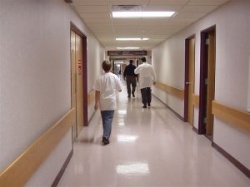Smoke-free NHS
Seeing the same GP associated with fewer hospital admissions
Older patients who see the same general practitioner over time experience fewer avoidable admissions to hospital for certain conditions, finds a study published by The BMJ today.

Healthcare systems in many countries are seeking to reduce hospital admissions for patients with conditions manageable in primary care (known as ambulatory care sensitive conditions). Emergency admissions for these conditions accounted for £1.42bn of spending in England (£170,590 for each general practice) in 2009-10.
The focus has largely been on improving access to primary care (for example, by extending opening hours or introducing remote care), but this might have the unintended effect of reducing continuity of care.
In fact, evidence suggests that continuity of care is declining in England - and its link with hospital admissions has been unclear. So researchers at The Health Foundation examined whether continuity of care with a general practitioner is associated with hospital admissions for ambulatory care sensitive conditions for older patients.
They analysed patient level data from English primary and secondary care records for over 230,000 patients aged between 62 and 82 years between April 2011 and March 2013. They chose to focus on older patients because they account for a high proportion of both GP consultations and potentially avoidable hospital admissions.
They found that continuity of care varied considerably across general practices in England, and tended to be lower in larger practices. Patients who saw the same general practitioner a greater proportion of the time experienced fewer admissions to hospital for ambulatory care sensitive conditions than other patients.
Indeed, compared with patients with low continuity of care, patients with medium continuity of care experienced almost 9% fewer of these admissions, and those with high continuity of care experienced just over 12% fewer.
This association was particularly true among patients who were heavy users of primary care (more than 18 visits over the study period).
The authors point to various explanations for their findings. For instance, continuous care might promote a more effective and trusting relationship between patients and doctors, leading to a better understanding of health problems and more appropriate care.
They stress that this is an observational study so no firm conclusions can be drawn about cause and effect. Nevertheless, they conclude that “strategies to improve the continuity of care in general practice may reduce secondary care costs, particularly for the heaviest users of healthcare.”
In a linked editorial, researchers at the University of Bristol suggest that seeing the same doctor “builds trust and a sense of mutual responsibility between patients and GPs” while a primary care system that is increasingly fragmented “provides the setting for patients to choose to attend an emergency department instead.”
Given the growing body of evidence supporting the importance of continuity of primary care, they call for “further policy initiatives to promote it and more support for general practices to help them improve it.
This would not only have benefits for patients, but would also improve job satisfaction for GPs and very likely reduce pressures on hospitals, they conclude.
Source: BMJ press release
02.02.2017





